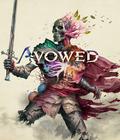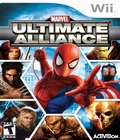Genre: Action/RPG
Publisher: Activision
Developer: Raven Software
Release Date: October 24, 2006
Comic book games are a real mixed bag. Few of them manage to capture the feel of adventure and excitement that the actual comics contain, and even fewer manage to capture the excitement of a team book like Justice League or The Avengers. The last attempt to capture the feel of a giant Marvel Comics crossover comic was Marvel: Rise of the Imperfects, which was met with mediocre reviews, and the reaction from both gamers and comic fans was lukewarm at best. Thankfully, Marvel: Ultimate Alliance finally manages to capture the feeling of a massive crossover storyline without sacrificing quality gameplay.
Die-hard comic fans be warned: Marvel: Ultimate Alliance isn't set in either the 616 or Ultimate version of the Marvel Universe. Instead, it exists in a sort of amalgam of the two, featuring designs and personalities from both. What this means is that continuity isn't as hard and fast as it could be, so don't stress yourself out over any incongruities in the storyline and continuity, and just enjoy the constant barrage of cameos.
Set in this original universe, the story is the stuff of which legends are made. Doctor Victor von Doom, villain extraordinaire, has gathered together all of the Earth's greatest villains, from those as lowly as The Scorpion to the god Loki, to form the new Masters of Evil. Launching a surprise attack on S.H.I.E.L.D's headquarters, the Masters of Evil leave S.H.I.E.L.D commander Nick Fury no choice but to call in every superhero in order to stop Von Doom's plan.
On the surface, Ultimate Alliance looks very similar to X-Men: Legends in many ways; it is simply X-Men Legends 3, but as anyone who's played Legends can tell you, that isn't a bad thing. At its core, Ultimate Alliance is an overhead beat-'em-up in a vein very similar to games like Gauntlet. Up to four players take control of some of the greatest heroes the Marvel Universe has to offer and work together to beat the Masters of Evil before their plans can come to fruition.
While X-Men: Legends limited you to only members of the X-Men with a few select cameos, Ultimate Alliance brings together heroes from all over the Marvel Universe. Everyone from Iron Man and Thor to Blade and Deadpool is available to join your team. Each hero plays significantly differently from one another and has his/her own specialty; Wolverine has almost no ranged attacks but a powerful melee attack and the ability to go into a berserk frenzy, for example, while Ms. Marvel has powerful energy beams and ally-boosting spells. It can be a bit frustrating if your favorite hero doesn't match your playing style, but that can be worked around with a strong team.
There is more to picking a team than choosing your favorite heroes, however. Specific combinations of superheroes unlock special "teams" that have access to new abilities not usually available. Some are obvious, such as using all four members of the Fantastic Four boosts the entire team's health; while some are more obscure, such as using former assassins increases the amount of cash dropped by enemies. Once you advance in the game, you can also create your own custom Super Team. Unlike the combination-specific teams, any four heroes can be part of this team; the team's attributes are powered up with "respect points" gained from using the same team for multiple missions. Switching up your team causes you to lose respect points, so decide carefully before exchanging one hero for another.
Beyond your team, each hero can be powered up as well; as heroes fight, they gain experience points and money. Experience points function like they do in most RPGs; collect enough, and the hero levels up. Beyond improved stats and more health and energy, players can also learn new powers for the heroes. Powers are divided into Projectiles and Beams (ranged attacks); Melee; Boost, which can buff up your heroes' powers; and Xtreme, special team attacks that do massive damage to everything on the screen. Points can be assigned automatically, or the player can spend them personally to focus the hero in a specific direction. Money, on the other hand, is used to upgrade a hero's costume. While each hero begins with a specific costume, performing side-quests can unlock new and different costumes, such as the new Stark Armor for Spider-Man or the classic cape-and-helmet costume for Thor. Different costumes have different attributes, ranging from improved healing ability to better experience gain, and selecting the correct costume can matter almost as much choosing powers. Additionally, the Marvel Heroes can also collect items of power from their defeated foes, like one of the Mandarin's rings, and equip them to gain further power.
Once you've created a team, you are taken to the next mission. (The transport method varies, depending on what your current S.H.I.E.L.D base is.) From a runaway S.H.I.E.L.D tank-base to the halls of Asgard, Doctor Doom's plot will take the heroes to countless locations in the Marvel Universe. The four heroes must battle through countless guards while completing various objectives as they traverse through the levels. Objectives can range from simply defeating a boss to escorting various characters to important locations, and teamwork is key.
One aspect of Marvel: Ultimate Alliance's gameplay that really stands out is the boss battles. While battles against lesser bosses like Bullseye play out like more difficult versions of normal fights, true boss battles are a whole different beast. Instead of simply punching a powerful foe into submission, the heroes generally have to outsmart them instead. Everything from trivia contests to God of War-like button sequences can come into play, and rarely do boss fights become tedious or boring.
At heart, Ultimate Alliance is a multiplayer title. When played single-player, all four characters are controlled by one controller. One is controlled directly, while the other three are AI-controlled and can be given very simple orders. While this works fairly well, the AI isn't the brightest in the world and can make some of the most complex boss battles more frustrating than it needs to be. Even the smartest AI is no match for a good friend on the couch next to you. Luckily, multiplayer gameplay is as good as it gets. Strongly reminiscent of Gauntlet, there are sure to be plenty of cheers when a tough boss is defeated and jeers when a valuable item is stolen from you.
For those who have the urge to play multiplayer without friends available, Ultimate Alliance also offers an online mode. Divided into Campaign mode, which is the regular game, and Arcade mode, a more competitive ranking variant, there's a lot to keep players busy here. Surprisingly, the PlayStation 2 online play is extremely smooth and generally lag-free. While finding other players can be a bit difficult, if you can get a multiplayer bout going, you're sure to have a good time.
Aside from the multiplayer content, Ultimate Alliance isn't lacking in things to unlock. There are countless hidden unlockables throughout the entire game, varying from simple objects like concept art and cinemas to hidden characters. One particularly notable feature is the Comic Missions. By collecting simulator discs, players can take a hero (or heroes) through a pseudo-recreation of one of his/her comic adventures. The faster a player completes the mission, the higher they are scored, and high scores unlock new costumes and upgrades. With simulator discs for every hero and many of the villains, this is a lot of extra content for your buck.
Again like Legends, Ultimate Alliance isn't the best-looking title. While all of the locations and characters are easily recognizable, the character models are very simplistic. The heroes have alternate costumes to add a bit of spice to their designs, but the enemies are quite different. Except for the bosses, you'll spend each stage punching the same foes over and over again. While the enemies vary from stage to stage, the length of the levels means you'll see countless identical A.I.M agents and Doombots. Similarly, the attack graphics are simplistic and repetitive; many heroes have identical attack animations, and a few that are the same with minor color differences. While this does prevent slowdown, especially with multiple attacks onscreen at the same time, it can be a little dull to watch after a while.
If there is one area where Ultimate Alliance fails, it's in the audio aspect. Music, what little of it there is, is dull and forgettable. It doesn't hinder the experience any, but it certainly doesn't add to it either. The bigger problem is in the voice acting. While a few characters were well-chosen, such as Spider-Man, for the large part, the voice actors are poor fits, both in quality and tone. They sound more like random people reading off cue-cards than superheroes, and in the numerous cut scenes and battle quotes, it really begins to stand out, especially if you continue to use the same team.
Marvel: Ultimate Alliance is clearly a worthy successor to the X-Men: Legends series and a great addition to the Marvel Universe's games. With great multiplayer fun, epic boss battles, tons of unlockable content and strong online play, any comic fan looking for a party game would do well to pick up a copy of Ultimate Alliance.
Score: 8.0/10
More articles about Marvel: Ultimate Alliance












 Marvel: Ultimate Alliance features a deep, rich gameplay experience by offering total team customization, where players create their own team name, icon and vehicle, as well as establish their team reputation as they play throughout the story. Gamers also have the option to level up each character individually to their liking, or all team members at the same time to keep their heroes balanced. With the game's new combat system, players battle against the world's most notorious Marvel Super Villains in the air, underwater, and on the ground, using grappling, blocking and dodging moves, by charging up their Super Hero powers before unleashing them, and using environmental objects as one and two-handed weapons.
Marvel: Ultimate Alliance features a deep, rich gameplay experience by offering total team customization, where players create their own team name, icon and vehicle, as well as establish their team reputation as they play throughout the story. Gamers also have the option to level up each character individually to their liking, or all team members at the same time to keep their heroes balanced. With the game's new combat system, players battle against the world's most notorious Marvel Super Villains in the air, underwater, and on the ground, using grappling, blocking and dodging moves, by charging up their Super Hero powers before unleashing them, and using environmental objects as one and two-handed weapons.












































